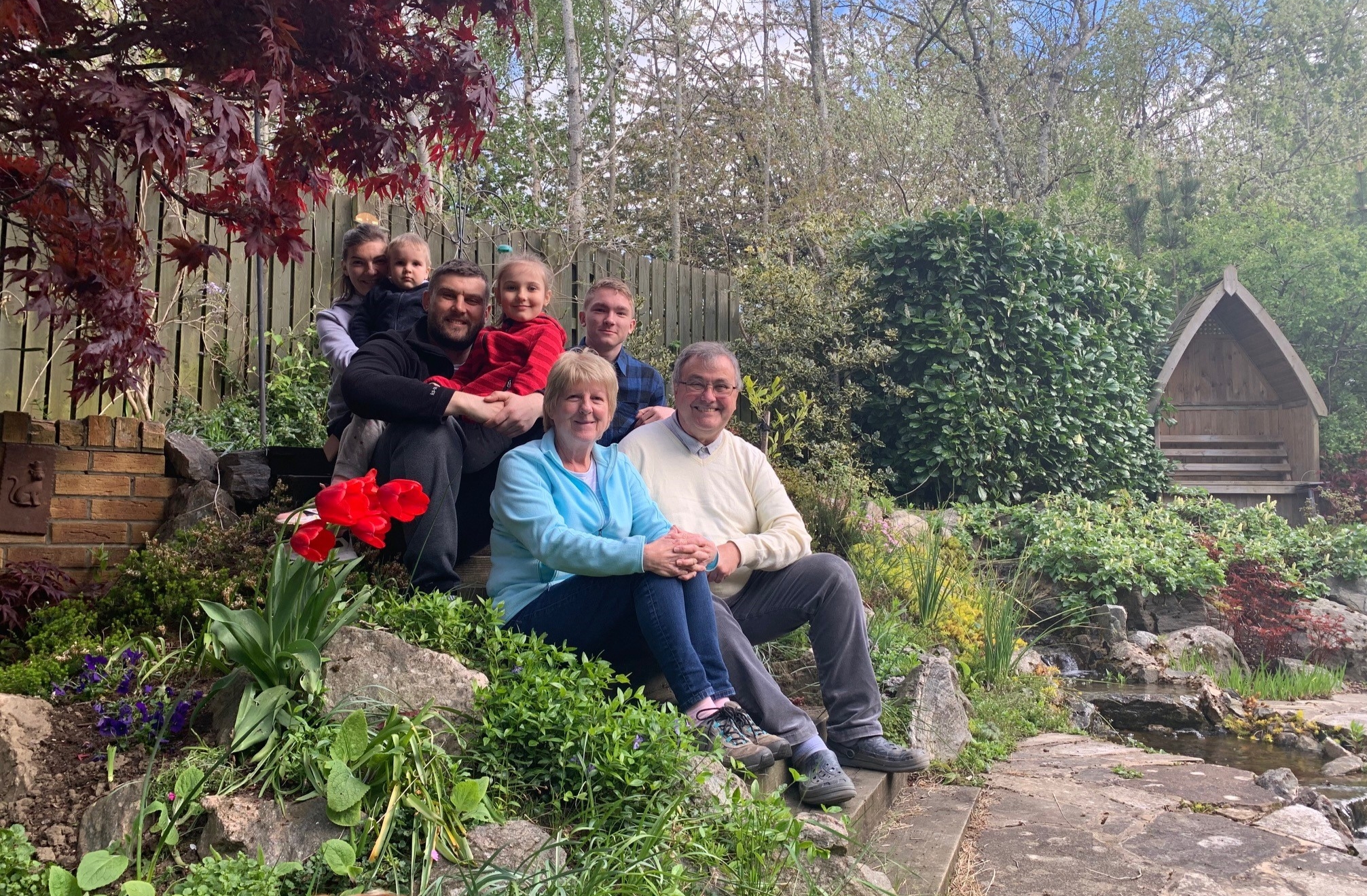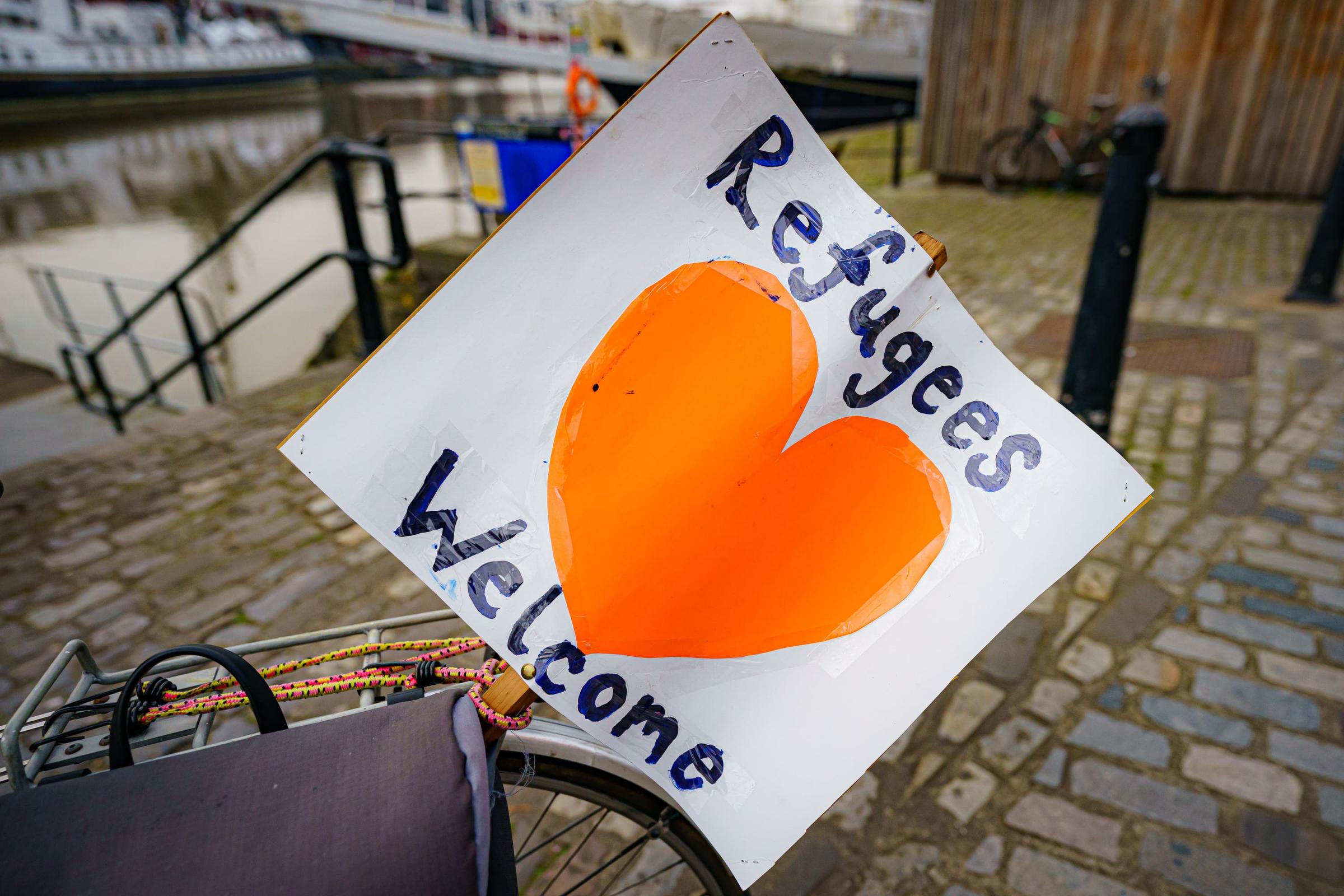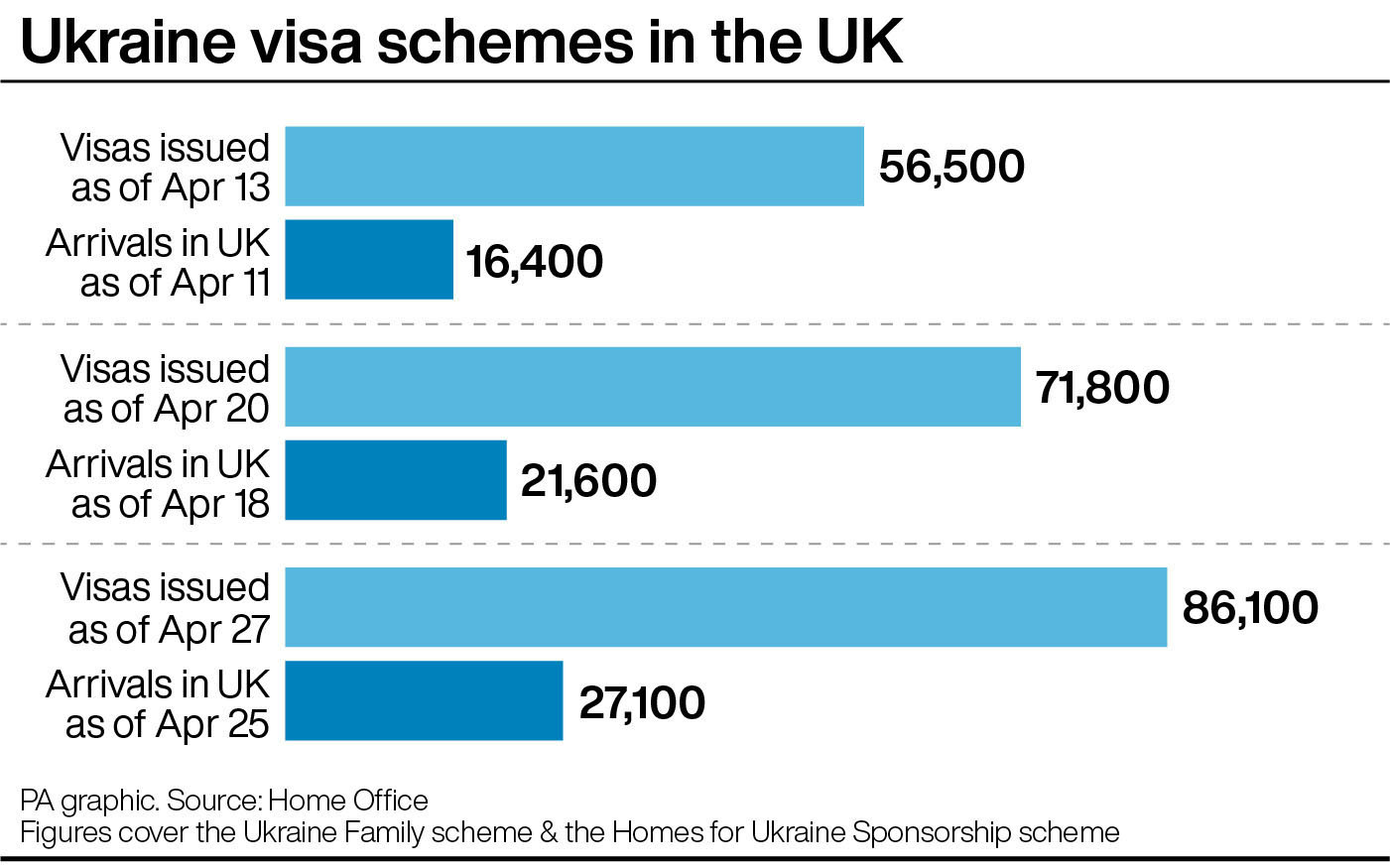
SCOTTISH host families have condemned the Homes for Ukraine scheme while accusing the UK Government of being “difficult, obstructionist and slow”.
Two host families told The National of the red tape and apparent “lack of urgency” they have had to deal with. They are among a growing number of hosts who have criticised the Homes for Ukraine Scheme and the UK's visa policy for Ukrainians.
Harry Smart from Montrose and Keith MacLeod from Broxburn both slammed the UK Government for its humanitarian response to the Russian invasion of Ukraine, which has seen millions flee the country.
Caroline and Keith MacLeod welcomed a family of five into their West Lothian home.
But the process hasn't been easy, Keith said, as he compared the Government to a “dysfunctional octopus”, claiming its response to the crisis has been fragmented and disorganised.
MacLeod said he has had “no help at all from the UK Government” for a scheme which has largely relied on hosts and refugees using social media and charities to find each other.
The MacLeods found mum Nika, dad Dima and their kids Nazar, Lyza and Davyd through a local church.
Keith told The National: “Our Ukrainian family needs an awful lot of help in very many different ways but all these [Government] arms are disconnected.

“Hosts are given no knowledge whatsoever under the Homes for Ukraine scheme. It feels like we’re going through so many blind alleys.
“The UK Government said that information would be dispersed. Well, they dispersed it maybe around themselves in Whitehall, but they didn't disperse it to anybody else.
“And do I think this is a dysfunctional octopus? Well, an octopus only has eight legs, I think this probably has about 25 legs.
“I used to run a business, and I wouldn't run a business in the disjointed way that this is all being done."

Keith rejected Home Secretary Priti Patel’s suggestion that the low numbers of refugees in the UK is because Ukrainians would rather stay nearer their home country.
Smart, who along with his wife took in 18-year-old Varvara Shevtsova to their Angus home, agreed, calling the claim “absurd”. He too has found issues with the UK's approach.
Smart told The National it took more than a month for Angus Council to carry out a home inspection, something he says the UK Government later decided was a requirement for a visa, adding yet another "bottleneck" to Shevtsova's application.
'Scottish people are so nice. And I don't feel like I'm a stranger at all. Everybody's so, so welcoming.' Varvara Shevtsova was sleeping in a bomb shelter just a month ago. Now, she has made Montrose her home. She says she's 'in love with Scottish culture'. pic.twitter.com/SBw9PTe2bA
— The National (@ScotNational) April 29, 2022
Angus Council has told Shevtsova, who is being hosted by Smart, that she will be ineligible for Universal Credit because she is technically still a student. Asked by The National about this, Angus Council said it was simply following the UK Government’s rules, which it has no say in.
Smart said the councils had been limited by dealing with the Home Office, which he described as “difficult, obstructionist and slow”.
He continued: “When we were doing the application and saw the upload requirements ... our impression was that this was a process that was designed to fail and nothing that we have seen since has made us change our view of that.

“It still seems to me that the Government is deliberately putting obstacles in the way of people who want to come here.
“As a UK citizen, I look at the UK response relative to the scale of the problem and compare that with other countries and I'm just deeply ashamed.”
Smart later added that the DWP had recognised an issue with its IT system and that they are working to resolve it.
Dave Doogan, MP for Angus, told The National this showed why Scotland should be in charge of its humanitarian response to Ukraine.
He said: “The UK is an embarrassing outlier with their dysfunctional and now completely discredited visa requirements on Ukrainian refugees fleeing a war zone for safety in Scotland and elsewhere on these islands.
“Ordinary people in Angus and elsewhere have stood up to be hosts for these families but have been frustrated at every turn by both the UK Home Office and the Department for Levelling Up in Whitehall who unbelievably have taken to blaming each other for the shortcomings of the scheme.
“If this was controlled directly by the Scottish Government we would have an effective person-centred humanitarian process rather than this Westminster hostile environment.”
A West Lothian Council spokesperson said: “We appreciate that initial delays in both the UK Government’s Home for Ukraine Scheme and the Scottish Government’s Super Sponsor Scheme have led to frustration for some Ukrainian refugees and their host families.
“Further information and guidance has now been received from both the Scottish and UK Governments to allow us to carry out the required checks, as well as liaison with registered host families. It takes time for us to carry all the necessary checks, with a priority system in place while we work through them all.”
Hannah Bardell, MP for Livingston, said: "It is abundantly clear that the Homes for Ukrainians Scheme set up by the UK Government has been a dysfunctional disaster from the start.
"With an urgent humanitarian catastrophe on the scale of the crisis in Ukraine, it is extremely concerning that barriers remain in place by the Home Office in front of desperate Ukrainians who are fleeing conflict. The UK Government must consider the safety of already traumatised individuals, especially small children who await in terror for a decision that could take up to a month to process.
"I have supported many families in my constituency that have opened their homes to those fleeing the conflict in Ukraine who are experiencing bureaucracy at every stage. For example, hosts are having to complete a 60-page questionnaire, while refugees are required to scan and upload a PDF file as the only way to prove imagery for documentation which is impossible to be met for families in evacuation facilities.
"We need a different approach that is compassionate, fair, and effective which ensures people who have lost everything are quickly given the protection and safety they desperately need in the UK.
"My colleagues and I will continue to raise these serious matters with the UK Government while I continue to do everything I can to support my constituents who have graciously opened their homes to our Ukrainian friends.“
A Scottish Government spokesperson said: “The bureaucratic administrative system the UK Government has put in place to respond to this humanitarian crisis is leaving many Ukrainians in a perilous situation awaiting clearance to travel.
“It is not only slow and complicated, but also raises a number of serious safeguarding concerns, with people at risk of arriving in the UK and placed in homes before suitable checks have been carried out.
“The Scottish Government introduced its super sponsor arrangements to provide a faster and safer alternative for Ukrainians fleeing this illegal war and recently suggested the UK Government introduce its own similar super sponsor arrangements.
“While engagement between governments has been constructive, the Scottish Government has repeatedly called on the UK Government to share data more regularly and to publish as much information as possible given the great public interest in making progress. For example, we are still awaiting the publication of data showing the numbers of actual arrivals of visa holders in Scotland and instead continue to rely on estimates.”
A UK Government spokesperson said: “Thanks to the generosity of the UK public, more than 86,000 visas have been granted with over 27,000 Ukrainians arriving safely in the UK.
“A dedicated visas and immigration helpline has assisted over 20,000 callers with questions about the Homes for Ukraine scheme, and sponsors can access FAQs on gov.uk. We also provide a welcome pack for Ukrainians with advice on adjusting to life here, and guidance to help sponsors once guests arrive.
“Councils are responsible for conducting safeguarding checks and must make at least one in-person visit to a sponsor’s property to ensure it is fit-for-purpose, but this is not a requirement before applying to the scheme.”







